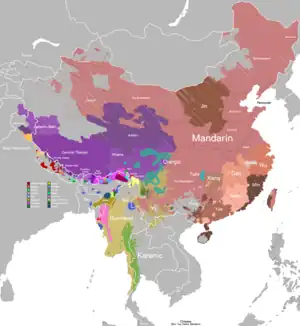Muda language
Muda (木达 or 母打) is a Loloish language of China.
| Muda | |
|---|---|
| Native to | China |
Native speakers | 2,000 (2007)[1] |
| Language codes | |
| ISO 639-3 | ymd |
| Glottolog | muda1235 |
| ELP | Muda |
 Muda is classified as Vulnerable by the UNESCO Atlas of the World's Languages in Danger | |
There are over 2,000 Muda speakers in Nanlianshan Village Community 南联山村委会[2] (formerly Nanlianshan District, 南联山乡, now part of Gasa Township 嘎洒镇), Jinghong City, Yunnan, China (Xu 1991).[3]
Classification
Xu (1991) classifies Muda as a Ha-Ya language (see Hani languages).
Hsiu (2018)[4] classifies Muda as an Akha language containing a Bisoid substratum, with the substrate language being an early split from Bisoid. Muda has Cl- consonant clusters like various Bisoid languages, Siloid languages, and Jinuo, while words of Bisoid origin include 'leg', 'house', and 'smoke'.
Phonology
Muda has the complex consonant onsets /pl, pʰl, bl, ml, pj, pʰj, bj, mj/ (Xu 1991:34).
Vocabulary
The following vocabulary of Muda is from Xu (1991).
| English gloss | Chinese gloss | Muda | Page |
|---|---|---|---|
| White | 白 | pʰlu⁵⁵ | 35 |
| Full | 满 | blaŋ³³ | 35 |
| Pus | 脓 | ()blaŋ⁵⁵ | 36 |
| Arrow | 箭 | ()mla³¹ | 36 |
| Broom | 扫帚 | ()pʰjɔ⁵⁵ | 36 |
| Bee | 蜜蜂 | bja³¹ | 36 |
| Lose, to | 遗失 | ()bjo̱³³ | 36 |
| Fly, to | 飞 | jɔ³³ | 36 |
| Monkey | 猴子 | ()mjo̱³¹ | 36 |
| Many | 多 | mja³¹ | 36 |
| Foot | 脚 | kʰɯ⁵⁵ | 37 |
| Six | 六 | ko̱³¹ | 37 |
| Gallbladder | 胆 | ()kʰɯ⁵⁵ | 37 |
| Star | 星星 | ()gɯ⁵⁵ | 37 |
| Copper | 铜 | gɯ³¹ | 37 |
| Tendon | 筋 | ()gu³¹ | 37 |
| Manure | 粪 | cçʰe³¹ | 38 |
| Root (classifier) | 根(量词) | cçʰaŋ³¹ | 38 |
| Wide | 宽 | ()ɟje⁵⁵ | 38 |
| Drop, to | 掉 | ɟja³³ | 38 |
| Day (time) | 天(日子) | naŋ³³ | 38 |
| Soft | 软 | nø̱³¹ | 38 |
| Cook, to | 煮 | tɕa̱³¹ | 38 |
| Sour | 酸 | tɕʰɛ⁵⁵ | 38 |
| Narrow | 窄 | tɕu̱³¹ | 38 |
| Lick, to | 舔 | tɕʰy⁵⁵ | 38 |
| Stick (classifier) | 条 | tɕa̱³³ | 38 |
| Cry, weep | 哭 | ɴo⁵⁵ | 39 |
| Steal, to | 偷 | qʰø³¹ | 39 |
| Bitter | 苦 | qʰa³¹ | 39 |
| Smoke (fog) | 烟(雾) | ()qʰø³¹ | 39 |
| Nine | 九 | ɢø³¹ | 39 |
| Curved | 弯 | ɢaŋ³¹ | 39 |
| Play, to | 玩耍 | ()ɢa³³ | 39 |
| Enter, to | 进 | aŋ⁵⁵ | 40 |
| Horse | 马 | maŋ³¹ | 40 |
| Open (door) | 开(门) | pʰaŋ³³ | 40 |
| Sell, to | 卖 | aŋ³¹ | 40 |
| Throat | 喉咙 | kʰaŋ³¹() | 40 |
| Dark | 暗 | jaŋ⁵⁵ | 40 |
| Pus | 脓 | ()blaŋ⁵⁵ | 40 |
| Full | 满 | blaŋ³³ | 40 |
| Money | 钱 | ()kʰaŋ⁵⁵ | 40 |
| Bear | 狗熊 | ()xum⁵⁵ | 40 |
| Otter | 水獭 | ()ɕum⁵⁵ | 40 |
| Iron | 铁 | ɕʰum⁵⁵ | 41 |
| Pile (of soil) | 堆(土) | blum⁵⁵ | 41 |
| House | 房屋 | ʑum⁵⁵ | 41 |
| Roast, to | 烤 | lum⁵⁵ | 41 |
| Round | 圆 | laŋ³³ | 41 |
| Surround, to | 包围 | ()laŋ⁵⁵ | 41 |
| Pond | 池塘 | laŋ³³() | 41 |
| Axe | 斧子 | ()dzɿ³³ | 41 |
| Woman | 女人 | ()mi³¹ | 41 |
| Louse | 虱子 | ɕɛ⁵⁵() | 41 |
| Goose | 鹅 | gɛ̱³³() | 41 |
| Push, to | 推 | dɛ³¹ | 41 |
| Edge | 边上 | ()dzɛ⁵⁵() | 41 |
| Eagle | 老鹰 | ()dzɛ⁵⁵ | 41 |
| Saddle | 鞍子 | ()qɔ̱³³ | 41 |
| Shallow | 浅 | tɛ̱³³ | 41 |
| Change, to | 改 | pʰa³³ | 41 |
| Winnow (rice), to | 簸(米) | ja⁵⁵ | 41 |
| See, to | 看见 | ()mɔ⁵⁵ | 41 |
| Mosquito | 蚊子 | ()gɔ³¹ | 41 |
| Change, to | 变 | pʰa⁵⁵ | 41 |
| Stick (classifier) | 条 | tɕa̱³³ | 41 |
| Leg | 腿 | bɔ⁵⁵() | 41 |
| Store, to | 铺 | qʰɔ³¹ | 41 |
References
- Muda at Ethnologue (18th ed., 2015) (subscription required)
- 景洪市嘎洒镇南联山村委会
- Xu Shixuan [徐世璇] (1991). 缅彝语几种音类的演变. Minzu Yuwen.
- Hsiu, Andrew. 2018. Classifications of some lesser-known Lolo-Burmese languages.
- Xu Shixuan [徐世璇] (1991). "Several types of sound changes in Lolo-Burmese languages [缅彝语几种音类的演变]." In Minzu Yuwen 1991(3), 34-41.
- http://asiaharvest.org/wp-content/themes/asia/docs/people-groups/China/chinaPeoples/M/Muda.pdf
This article is issued from Wikipedia. The text is licensed under Creative Commons - Attribution - Sharealike. Additional terms may apply for the media files.
